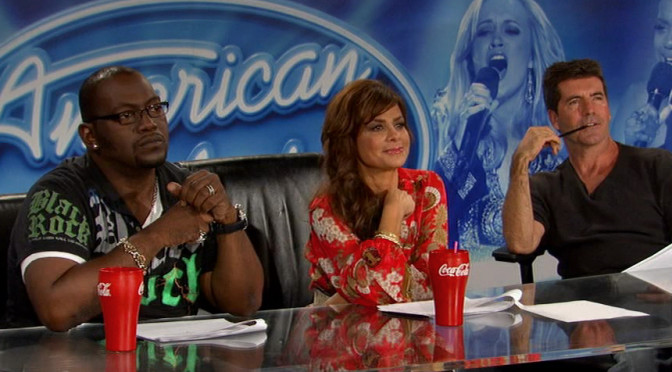You can take a peer writing tutor out of the UCWbL, but you can’t take the UCWbL out of a peer writing tutor. One quarter into my first year at the UCWbL, I have found this to be increasingly true.
Whenever I hear someone say that a paper or a film was good, my first reaction is to say, “That’s evaluative…” and then I wish they would go on to explain why elements of it were effective. Please tell me I’m not the only UCWbLer this happens too, that’d be awkward. I notice good/bad praise is particularly pervasive is in Reality-Competition TV Shows. While this type of commentary and feedback on contestants is entertaining (just look at the viewing numbers shows like this generate), we as peer writing tutors know that it in ineffective at best.
There is a wide breadth of Reality-Competition shows on TV, but for the purpose of this blog post I’m going to pick one—American Idol. This cultural phenomenon is built around aspiring singers who compete each week for the affection of the TV viewing audience (America at large) and a panel of judges.
The OG triumvirate of judges from the show’s first couple seasons—Randy Jackson, Paula Abdul, and Simon Cowell—all had very different personalities and critiquing styles that affected the feedback they gave to contestants. As I re-watch some of the feedbacks from this era of the show some things stand out to the peer writing tutor in me.
The first thing I noticed was Randy Jackson’s directive approach to giving feedback. Based on “A Critique of Pure Tutoring” by Shamoon & Burns, “Directive Tutoring” can be described as an instruction-based approach that focuses on clearly identifying and correcting areas of weakness and errors. Randy is very upfront and available with advice and “always want[s] to give constructive criticism”. Like a good directive peer writing tutor, he maintains a positive attitude and makes suggestions while trying to maintain the contestants’ artistic integrity. See Randy giving constructive feedback to a contestant in the video below (Randy’s comments begin around 4:10).
A common trend I noticed in Paula Adul’s comments on the show was that they were consistently person praise. Paula constantly says things to contestants like, “I like you.” Whenever I heard this, the peer writing tutor in me cringed. Despite that fact that it has earned her a reputation as the “nicest” judge, it is unhelpful to contestants looking to improve. Person praise—as described by Maclennan—is praise that is directed at the student as a person. This is in contrast to process praise, which is directed at the “efforts or strategies” used by the student. Positive process-based praise can make us feel great about ourselves and we’ll end up like this famous “Breakroom” character.
http://https://www.youtube.com/watch?v=jzBhH7rTC70
If anyone represents a blatant affront to our philosophy as peer writing tutors, it is Simon Cowell. The UCWbL collectively cowers every time he opens his mouth and verbally assaults the personalities or abilities of a contestant. If Simon worked at the UCWbL he would be the punch line of most jokes and Writing Center tales for the first quarter until he mysteriously disappeared in the ensuing quarter until it became evident that he failed his performance review. By saying things like “you’re terrible,” Simon destroys any motivation the contestants had to improve. His comments can make them feel unworthy of continuing.
As peer writing tutors, we know that the most effective type of praise is process praise. Process praise encourages writers to utilize the same effective writing processes that achieved great results. Are there some examples of process praise in Reality-Competition Shows? Leave your opinion or examples in the Comment Section below.
Discover more from UCWbLing
Subscribe to get the latest posts sent to your email.


2 replies on “The UCWbL on American Idol (SPOILER ALERT: Simon gets fired)”
Hey Ian,
Your choice of subject, along with video examples and academic source material, gives this a really funny yet credible (and slightly sarcastic, as expected) tone which I happen to enjoy. Simon Cowell saying “you’re terrible” will definitely be my new go-to example of ineffective evaluative language.
Also, I do the “That’s evaluative…” thing ALL the time, so you’re not alone.
Hi Ian,
I completely agree with Maya that your approach on this topic provided new insight into this topic. The combination of familiarity and comedy made this an easy read and also allowed me to easily question the judge’s tutoring styles. And I feel the need to defend Paula’s position because I always thought her purpose was to help the singer feel good before or after being told that they need to improve x, y, and z from Randy and Simon.
Also, in other competition shows, I think I have only seen mentors be like Randy and Simon. Trying to recollect The Voice, I think Blake was the best mentor (as evidenced by his many wins) because he is more like Randy–he provides constructive criticism but encourages his singers to “do them.”